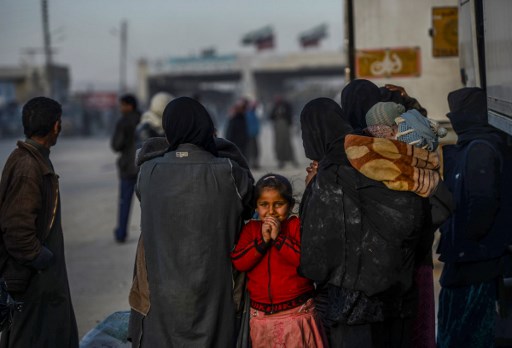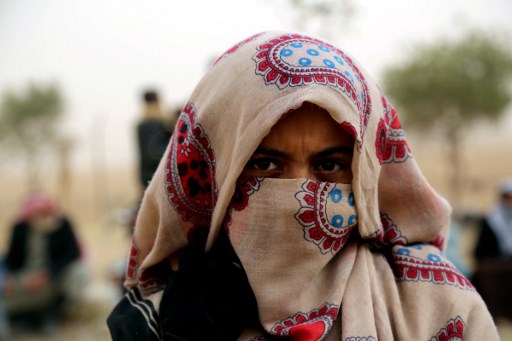The matchmaker sent Samar’s picture to the Saudi man who was 35 years her senior. He accepted. The wedding ceremony was held quickly, and just as abruptly, the marriage ended.
With a sad face, Samar tells how “a sheikh and two witnesses came over, and my so-called husband gave me 2000 dollars as dowry, then took me to an apartment he rented. The very next day, I woke up to a note saying the rent was paid for, and that he left and was not coming back. The landlady told me not to worry, ‘I’ll find you another husband if you want.”

“Girls’ Residence”
The famous al-Fatih neighbourhood, in the heart of Istanbul, is a business and trade center for Syrians. This is where the girls’ stories usually begin. Around here, they can find special rentals, known as “Girls’ Residence,” where the landlady often turns out to be a professional matchmaker. Most roommates are refugees, some entered Turkey illegally, others are struggling with some kind of social problem or other. There are divorcées, widows, as well as minors who came from Syria unaccompanied.
Their difficult financial situation makes these Syrian refugee girls vulnerable to exploitation by matchmakers and brokers who see in them a mere money-making opportunity, and who resort to swindling and theft to take advantage of them.
Fatima Abdul-Aziz is the head of “Al-Kawakiby Women’s Organization in Mersin, Turkey,” which is concerned with Syrian refugee women’s affairs. She believes that “what most contributes to this phenomenon are the dissociation of family and social ties, poverty, and the seduction of what is often presented to these girls as a more comfortable and secure life.”
On July 11, I was able to get a copy of an arrest warrant in the northwestern city of Sakarya, issued against a Syrian female matchmaker, charged with facilitating prostitution, deception and fraud. A dispute between two men, one Saudi, the other Syrian, led to her arrest. In her deposition, the matchmaker admits to fraud, as she took money to arrange marriages, but denied prostitution charges.
Numbers
According to a survey by the Directorate General of Migration Management, a subdivision of the Turkish Ministry of Interior, of the 4 million Syrian refugees in the country, around 1.4 million are female.
United Nations puts at 1.2 million the number of Syrians working without a permit in Turkey. The majority accept much lower wages and more severe conditions than Turkish workers would.
Evrensel website published a study that found “most Syrians are living below the poverty line and working without social security. 50% are unemployment, and 13% have applied for financial aid.” The study was conducted by the Center for Social Policies, and took place in the provinces that host the largest numbers of Syrian refugees.
While both official and NGO statistics on fraudulent marriages are lacking, and judging from the cases reviewed by the center, Abdul-Aziz asserts that “matchmaker” has become a pseudonym for a type of broker who provides Syrian refugee wives for Arab men in return for a commission, well aware that such marriages would not last long: “Lately, we have been receiving many legal inquiries into fraud, committed in the name of marrying Syrian refugees,” she adds.
Secrecy and Fear
Majd Tabba’, a lawyer who has examined several such cases in Turkey, thinks that the dearth of data is due to the fact that “victims of these widespread marriages tend to keep them a secret, for fear of social stigma and family rejection.”


A One-day Marriage
It was indeed difficult to meet women who fell victim to the matchmakers’ network. Many keep a low profile and refuse to talk about this sensitive topic. Those who did talk requested their names be withheld to protect their privacy.
Samar, who came to Turkey two years ago, recalls that she was first introduced to Um-Rihab as the lady who offers free accommodation for Syrian female refugees, “just for the love of God,” as the landlady often told the girls who lived under her roof. “In the beginning, things seemed normal and Um-Rihab treated us well,” says Samar, “but then she collected our photos and copies of our documents, and claimed she was seeking funding from ‘charitable people’. Next, she began insinuating that I have a suitor, a rich man who would give me all I wanted. When I first refused, her attitude changed and she began to treat me badly. In the end, I had to accept.”
How Does a “Marriage by Picture” Work?
The deal takes place on the matchmaker’s social media account, where she provides her name and phone number. The following steps are followed via texts or calls:
First step: the matchmaker asks the male postulant to choose a category, “single, divorced, or widowed.”
Second step: money is discussed.
Third step: The girls’ pictures are sent through Whatsapp, then erased immediately.
Fourth step: if an agreement is reached, a wedding date is set.
Marriage on Vacation
I sat down with Rihab, a 20-year-old who got married to a Saudi national, who then divorced her by phone. She realized the groom only wanted her for the duration of his holiday. She had fallen victim to a so-called “misyar marriage.” According to Islam Web, misyar is a type of marriage contract where the husband and wife are able to renounce some marital rights such as living together, the wife’s rights to housing and maintenance money and the husband’s right to homekeeping and access, the later usually relinquished in order to keep the marriage secret from his first wife and children. Unlike the marriage of mut’ah (pleasure,) misyar has no time limit. If it does, the contract is actually considered null.
In Asenuret neighborhood in Istanbul, Rihab says her matchmaker had asked her to keep the union a secret. “I wanted to get married and leave the girls’ residence. He stayed with me for only one week. We kept in touch for another month, after which he asked me to hand over the apartment to the landlord. He had only rented it for one month. Then he divorced me on the phone, said I was now free, and he had fulfilled all his financial obligations.” But Rihab did not receive any dowry, and the jewelry he gifted her turned out to be fake and worthless. She called the matchmaker to inquire: “Um-Hussein said she did not owe me anything, and the only thing she could do is find me another husband, also in secrecy. It was then obvious that the lady was marrying off girls and pocketing their dowry in addition to her fees. After that, she again offers them free residence, on the condition that they undergo hymen reconstruction surgery, so that she offers them up for marriage again as virgins. I refused to do that.”
When I contacted Um-Rihab, the matchmaker, she denied the whole story, and insisted on knowing the name of the girl in question, which of course, I could not reveal, to protect Rihab.
“A man hailing from a Gulf state is considered a catch. I perused many Whatsapp messages sent to Saudi men advertising Syrian girls in Turkey who “want to get married”
A Journey In Search of a “Bride”
It does not take advanced research skills to get in touch with a matchmaker. Do a google search and you will find a large number of them operating on social media platforms where they post statistics of the promised brides, including their age, height, weight, hair and eye color.
To know more about the nature of their job, I contacted Um-Qusai, another matchmaker in Istanbul, on WhatsApp, and posed as a postulant who is looking for a Syrian girl to marry. Um-Qusai gave me her offers in detail: “A virgin would cost you between $7,000 and $10,000, in addition to the jewelry, which would be part of “personal clothing.” Divorcées and widows range from $3,000 to $6,000.” What about her fees, I asked? “Brother,” she said, “I charge $1000. If that is okay with you, then I’ll immediately send you some pictures of what I have.”
She sent me pictures of many girls, insisted the union ceremony be officiated by an imam or sheikh, not in court. Dowry and commission are to be paid ahead of the wedding.
Ali has a friend in the Gulf who was seeking a wife and ended up falling for the matchmakers’ scheme. Ali was there and has seen it all: “Their network is not centralized. After the groom agrees to their terms and conditions, all those who helped him get married disappear on wedding night. They disconnect cell phones and abandon their apartments without leaving a trace.”
A man hailing from a Gulf state is considered a catch. I perused many Whatsapp messages sent to Saudi men advertising Syrian girls in Turkey who “want to get married. All you need do is transfer money to the bride you choose to help her get ready. Then come and consummate the marriage in Turkey.”
For years, Saudi authorities have been aware of this scheme. In 2016, the Saudi embassy in Istanbul issued a warning for its nationals to beware “suspects using fake documents and Syrian IDs in the Turkish cities near the Syrian border, who have been luring in marriage-seeking citizens, through ads on social media platforms. The citizens then come to Turkey only to realize they have been victims of swindling and fraud.”
Defrauding Arabs and Turks
Sherif (30), an Egyptian citizen living in Istanbul, also has a similar story. The girl he was offered to marry turned out to be already married, so he lost both the mahr and other expenses, totalling $10,000. The “wife” escaped the next morning, after stealing his belongings. She took the marriage contract with her, as well. Sherif had no means to prove he was robbed. There was no evidence of fraud, because he neither knew the witnesses nor the sheikh who wrote the contract. The only thing remaining is the Whatsapp messages, but the number no longer exists, and it was never officially registered.
These criminal rings do not spare Turkish citizens either. Last month, Turkish media platforms were buzzing with the news of the arrest of a “Syrian gang ” in Kayseri Province, after security forces received a complaint that they “defrauded a 51-year-old Turkish man of 40,000 liras to marry a 20-year-old Syrian girl, who took the money and disappeared.” The ring consisted of the girl, her 41-year-old father, and her 29-year-old aunt. Interrogated in Hatay Province in the south, they confessed they had “committed the same scheme in 5 other Turkish cities, and earned more than 2 million liras”.
- Article 301 of the Turkish Penal Code states the following:
1- Fraud is punishable by up to three years in prison.
2- Foreign claimants must deposit 10% of the amount mentioned in the case.
Source: The attorney, Majd Al-Tabba’
Girls in the Network
Deceit runs in both directions. There are internet matchmaking gangs who specifically prey on young Syrian men. The brides-to-be are gang members themselves.
Searching for his dream girl, Muhammad (28) from Deir ez-Zur, ended up losing $8,000 to a gang. That money was all he had. “Suddenly everything was gone,” he says.
It all started last year when Mohammad asked a matchmaker to find him a bride in return for a commission. When the bride was ready, Mohammad went to meet her. She was with her brother, matchmaker himself, and a local sheikh who came to wed the pair. After the wedding, the bride asked him to take her to an outdoor restaurant. 15 minutes into dinner, she went to the restrooms and that was the last time he saw her. She disappeared and her cell phone number was immediately disconnected.
Forged Documents & Other Creative Methods
The matchmakers’ stratagems vary from one case to another. Some, for example, especially defraud old Arab men living in Istanbul, as Majd al-Tabba’ points out: “These are not simple fraud cases. These are organized mafia rings consisting of men and women with forged documents and fake IDs. And they change their plans according to the targeted victim.” Al-Tabba’ took up a case where a matchmaker, Um-Mohammad, conned $20, 000 out of a 54-year-old Saudi man, via a Facebook ad offering him a chance to have a second wife: “All the documents we checked, passports, IDs and lease contracts, were fake, and cell phone numbers were unregistered, which left the case pending the identification of the perpetrators.”
Solutions
According to Fatima Abdul-Aziz, in order to curb this phenomenon “refugees should form communities in their asylum countries, to get to know each other and communicate. It is also important to hold awareness-raising seminars to educate women about their marriage and divorce rights, in order to prevent them from being exploited.”
In the meanwhile, Samar and Rihab are working in a tailor shop. Marriage is now the last item on their priority lists. They doubt they will ever get married again. And al-Tabba’s 54-year-old client is still awaiting the Turkish court’s decision on his case.






